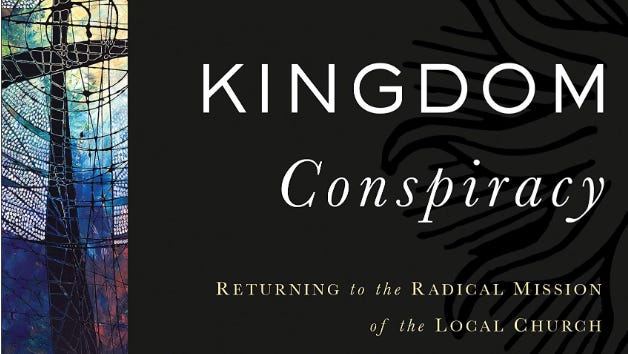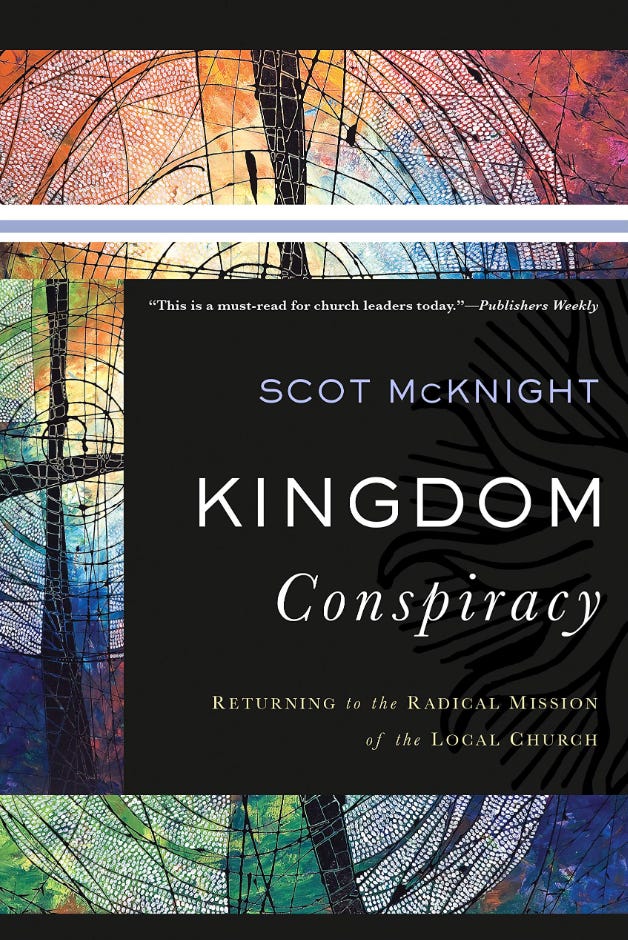Kingdom-Shaped Christianity
What happens if the church, if Christianity, gets re-shaped by Jesus’s vision of the kingdom? First, let’s get kingdom sorted out. (Based on lecture notes and my book, Kingdom Conspiracy.)
The church can be fruitfully compared to the kingdom. So far as the church falls short of its kingdom vision, it fails to be the church. I believe we need to connect kingdom and church more than many do. Give it a chance.
A kingdom in the world of Jesus had five elements: a king, a rule by a king, a people over whom the king ruled, a law articulated by the king, and a territory over which the king ruled.
1. The word Kingdom in Judaism -- OT, Josephus -- has a natural synonym in the word "nation" not the word "redemption" or "salvation." Thus, kingdom is front and center about a people and cannot be limited either to a social ethic or a redemptive moment.
2. Kingdom is a complex, almost always, with varying degrees of emphasis, of king, rule, people, land and law.
Church is a complex: a king (Christ), a rule (Christ rules over the Body of Christ), a people (church), land (expanding Israel into the diaspora), and law (law of Christ, life in Spirit).
3. Kingdom is "eschatological": both present and future. The kingdom’s future entails a flourishing fellowship of people following final judgment and the establishment of righteousness, and that kingdom sets the tone for kingdom living now.
Church is also eschatological: both present and future. The church’s future is also one of a flourishing fellowship forever according to the plan of God in history.
4. When comparing kingdom to church, most people make fundamental logical errors. The most common is to compare future kingdom and present church. Kingdom is a both-and, a now and a not-yet. The church also is a both-and, a now and not yet. The church, then, is an eschatological reality. To compare kingdom to church one must compare now kingdom with now church and not yet kingdom with not yet church. When we compare present kingdom and present church, or future kingdom and future church, we come out with near identities. So…
This means it is reasonable to say the kingdom is the church, the church is the kingdom, that they are the same even if they are not identical.
5. The church’s historical temptation is to make "kingdom" public by aligning itself with the state or the powers of culture, often called the Constantinian Temptation. When we align kingdom/church with the state we dilute kingdom and the church. Always. Christian nationalism clearly exemplifies this Constantinian temptation.
The most common mistake made in the USA is when Christians perceive America as the location of kingdom activity. There is a very subtle (at times) slippage from kingdom to USA. The church is at its best when it works from the margins for the good of the USA instead of assuming power in the center and imposing its beliefs on the rest of the USA.
6. The danger of politicizing Christian activism is the de-centering of the church by making the church an arm of the government, or surrendering the church to the government. Again, the church remains the church when it operates from the margins instead of assuming the powers of the government.
Dominionism is an idolatrous sickness.
7. Christ came to build the church/kingdom, and the church works best when it extends its efforts from the church into the public sector. That is, the church becomes the testing place, the workplace, and the proven example for kingdom realities that can be extended into the public sector.
When the church exemplifies multiracial equalities and economic equities it gains credibility as a prophetic voice in the public. When it imposes enlightenment’s capitalism upon the nation it ruins the witness of the church.
8. The character of a king determines the character of the kingdom. The “character” of Jesus can be seen in the titles used for him – Son of Man, Son of God, and Messiah – titles that evoke the story of one exalted to be King following suffering and death. Thus, the kingdom becomes cruciform by virtue of the character of King Jesus.
9. Kingdom citizens are Jesus-redeemed humans, people who have been saved from sin, liberated from cosmic powers, and who are conquering systemic evil through the power of the Spirit. Again, from the church into the public, not the public onto the rest of the public (and the church).
10. Kingdom and church don't resolve their relationship until you form a biblical understanding of the "world." A theme in great need of once again become significant for Christian discipleship. Worldliness, however, is not about the Do’s and Don’t’s of yesteryear’s fundamentalism. Worldliness in the hands of perceptive thinkers will discern the potency of the principalities and powers in our day, expose them, and lead kingdom people toward a new form of community life. Worldliness must be organic: each country will express worldliness in its own way.
11. Kingdom citizens are a moral fellowship marked by a cruciform life of righteousness and love, and this life permeates every dimension of life, including peace and possessions.
12. Connecting kingdom to church does not "disengage" the Christian. It redefines engagement toward:
Beginning with the alternative community in the local church where kingdom realities are worked out in praxis.
Fostering a loving community of good deeds, seen in Matthew 5:13-16 but especially in the "good works" in 1 Peter (public benevolence) out of love. Christian public actions are then the "spillover" of the church's inner workings.




This is the first book by Scot I read and many of the ideas I had, conformed to the world, were challenged. Love it
Yes, Thank You! Scot! Great “brain yeast” to cause thought to expand! Even just this post will make a great study catalyst!
- What happens when different kingdoms are all playing around the mosh pit?
- How can we steer Jesus’ Kingdom (the people believing in, and identifying with Jesus’ Kingdom) to a better understanding of our place among the kingdoms on this planet?
What would another name for Jesus better kind of kingdom be?
Thanks!